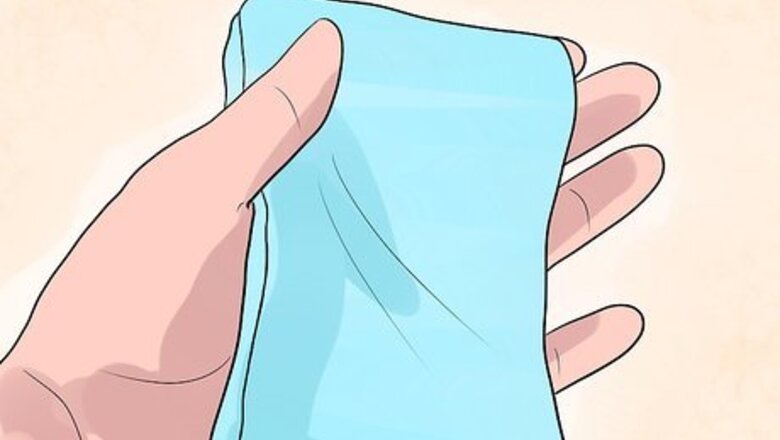
views
- Spot clean casts by wiping them with a damp cloth, then drying them off completely. Don’t get casts fully wet unless the cast and the lining are waterproof.
- For tougher stains on fiberglass casts, use a small amount of dish soap or a baby wipe, then dry it completely. Never use anything but a damp cloth on plaster.
- Wrap your cast in plastic and secure it with waterproof tape or use a cast protector when bathing.
Cleaning the Cast
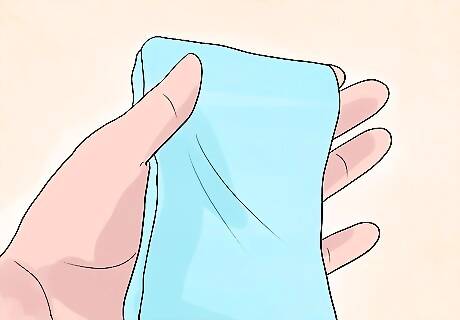
Wipe the outside of the cast with a damp cloth. If you get a fiberglass or plaster cast dirty, wipe off the dirt, food, or other mark with a damp cloth, then dry it completely. Don’t use a wet cloth and don’t leave any wetness behind. Never get your cast wet or submerge it in water, even if it gets dirty. Plaster casts disintegrate in water, and although fiberglass casts are waterproof, the soft lining inside is not. If you have a fiberglass cast and a waterproof liner, you may be able to get the cast wet. Ask your doctor for more information.
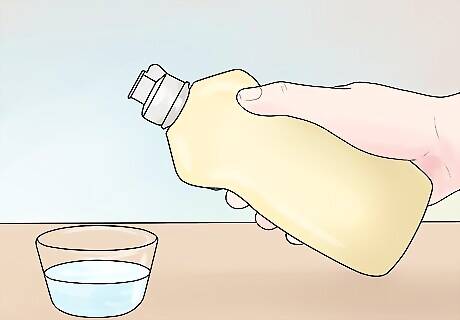
Use mild detergent to clean fiberglass casts. If a damp cloth isn’t enough to clean your fiberglass cast, clean it with a mild dish detergent. Put a small amount of dish detergent on a damp cloth. Gently and carefully wipe away the dirt. Use a dry cloth to wipe away the soap and dry the cast.
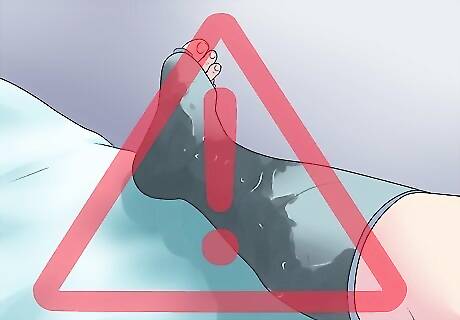
Keep the cast from getting dirty and smelly. Since casts can’t have water on them, the best way to keep them clean is to prevent them from getting dirty. Keep your cast away from dirt and sand, and limit your physical activity to prevent sweating in it. Be careful when you eat. Try not to drop food onto or into the cast. If you need to, cover the cast while you eat. This may be important if a child has an arm cast. Sweating in your cast can make it smell bad, so don’t play sports or exert yourself more than you need to. If you have a cast on your leg or foot, consider getting a boot to cover it with.
Keeping Your Cast Dry
Protect the cast when you bathe or shower. When you take a bath or shower, put plastic around the cast, and don’t put that part of your body into the water. You can use cast covers or plastic bags secured with rubber bands or waterproof tape to help keep your arm dry. When you bathe, keep your cast dry, even if it’s fiberglass. Don’t try to wash the cast in the shower. It may be easier to give children a sponge bath to ensure that their cast stays dry. If your fiberglass cast has a waterproof liner, you may be able to shower with it. Ask your doctor before you try.
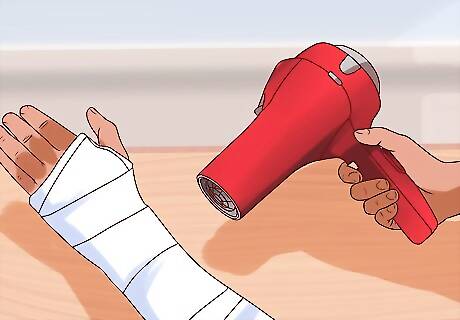
Dry your plaster cast with a hairdryer on cool. If you happen to get your plaster cast wet or you sweat inside your cast, dry it inside and out with a hair dryer set to cool. This provides air to dry the cast. Don’t use the hairdryer set on the warm or hot setting. This can burn the skin and cause irritation. It can also cause more sweating and moisture in the cast.
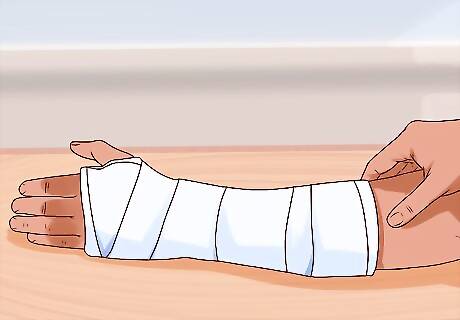
Let fully waterproof fiberglass casts dry naturally. If you have a fiberglass cast with a waterproof liner, you may be able to submerge it in water, either in the shower or swimming pool. After you get out of the water, it takes around an hour for the inside of the cast to dry. Be patient and let the cast dry naturally. Don't use a hairdryer to try to dry the fiberglass cast faster. Don't stick a towel in or around the fiberglass cast.
Taking Care of Other Concerns with Your Cast
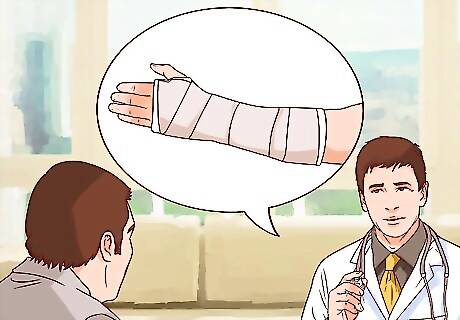
Determine if you have a fiberglass or plaster cast. Though taking care of a fiberglass or plaster cast is similar, there are important distinctions between the two. Make sure you know what kind of cast you have and the type of liner you have so you can care for your cast properly. Fiberglass casts can hold up better if they happen to get wet. However, you should not submerge them in water, go swimming with them, or take a shower with them if you have a normal liner. The liner can get wet and irritate or cause sores on your skin inside the cast. Some fiberglass casts come with waterproof liners. If you have a waterproof liner, you may be able to submerge it in water, but only with your doctor's approval. For example, you may be able to go swimming or take a bath with it. Plaster casts cannot get wet. Water can damage the cast and cause problems. It may even cause the cast to dissolve and fall apart. Take care to always keep your plaster cast dry.
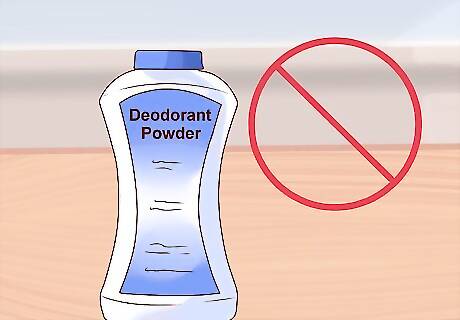
Sprinkle baking soda or rub a dryer sheet on smelly casts. Ask your doctor if you can use moisture absorbing powders like Gold Bond Body Powder or baking soda on your cast. Sprinkling these powders on your cast and around the opening can help reduce smell, but never put anything on the skin under or around the cast. You can also rub a clean dryer sheet on the outside of the cast. It’s normal for a cast to start smelling, but if it’s particularly bad you can ask your doctor for a new one.
Keep the injured limb elevated to prevent swelling. Prop your limb up with pillows to keep it above your heart for 24-72 hours after getting the cast. Keep it elevated as much as you can afterward to help prevent swelling. You can also put ice on your cast to help with itching or swelling—just use a completely dry plastic bag or ice pack to prevent getting the cast wet.
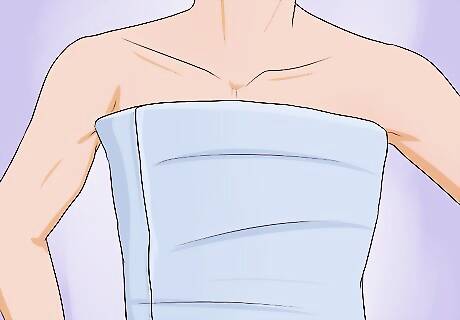
Use care with body casts when going to the bathroom. Body casts can be difficult to deal with and keep clean, especially when going to the bathroom. If you or your child has a body cast, don’t let urine get on the cast. Find a way to prevent splashing urine onto the cast, such as toilet paper in the bedpan. Make sure no urine rolls along the skin into the cast. Wipe away the urine immediately.

Know when to see the doctor. If you somehow get the cast completely wet, you may need to see a doctor. Sometimes, a wet cast will completely dry, but often it won’t and can cause sore spots on your skin inside the cast. You should call the doctor if you notice: Pain and tightness in the injured limb Numbness or tingling in the injured hand or foot Burning or stinging under the cast Injured fingers or toes of the injured limb becoming cold or turning blue Inability to move fingers or toes of the injured limb Swelling below the cast Red or raw skin around the cast Fever of 101F (38C) or higher If the cast has gotten wet but has not dried after 24 hours, call the doctor. Most casts will start to smell a little after you wear a while. However, any foul or extremely bad odors are an indication of a problem. See a doctor if the smell is bad because it might mean you have an infection.


















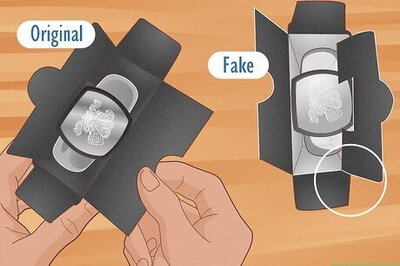

Comments
0 comment